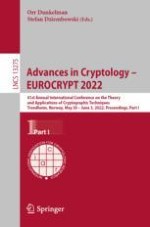2022 | OriginalPaper | Chapter
On the Security of ECDSA with Additive Key Derivation and Presignatures
Authors : Jens Groth, Victor Shoup
Published in: Advances in Cryptology – EUROCRYPT 2022
Publisher: Springer International Publishing
Activate our intelligent search to find suitable subject content or patents.
Select sections of text to find matching patents with Artificial Intelligence. powered by
Select sections of text to find additional relevant content using AI-assisted search. powered by
